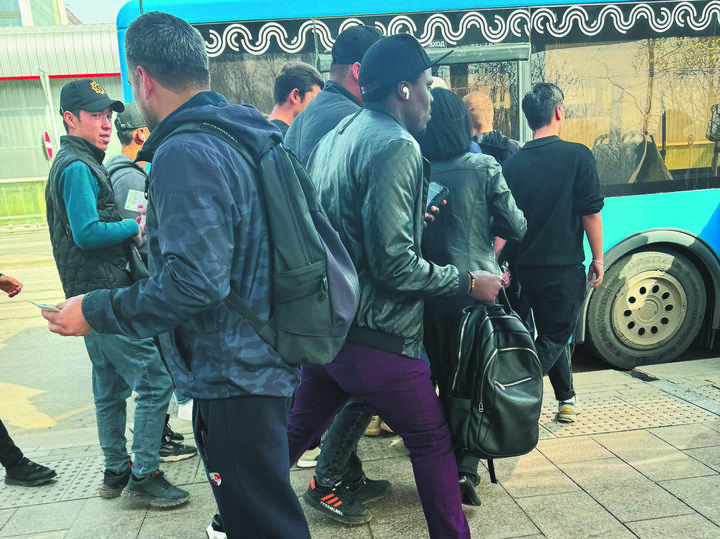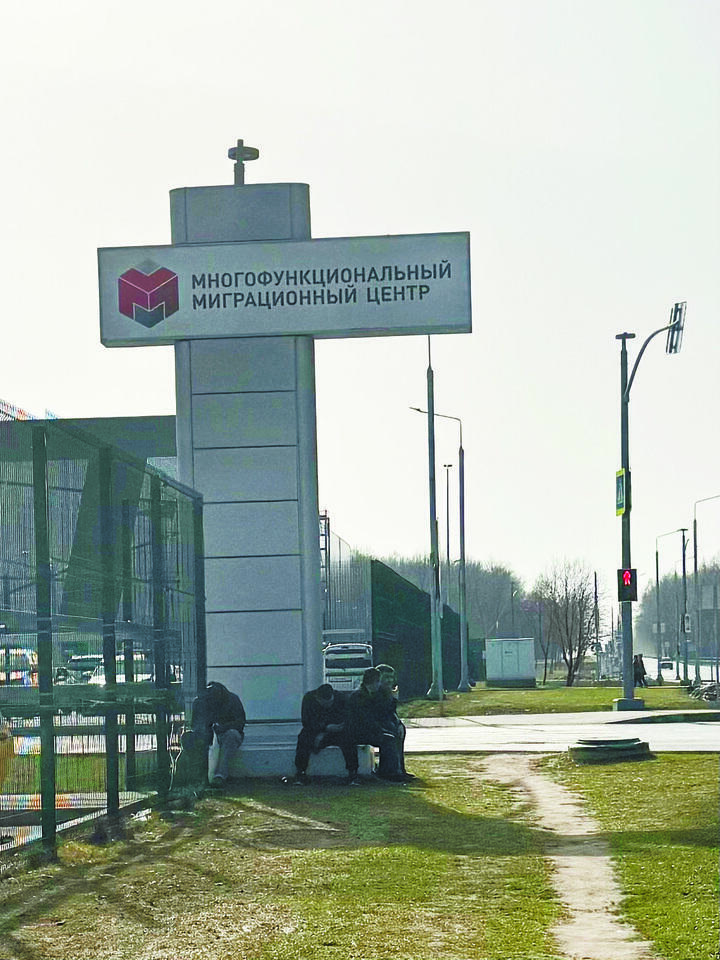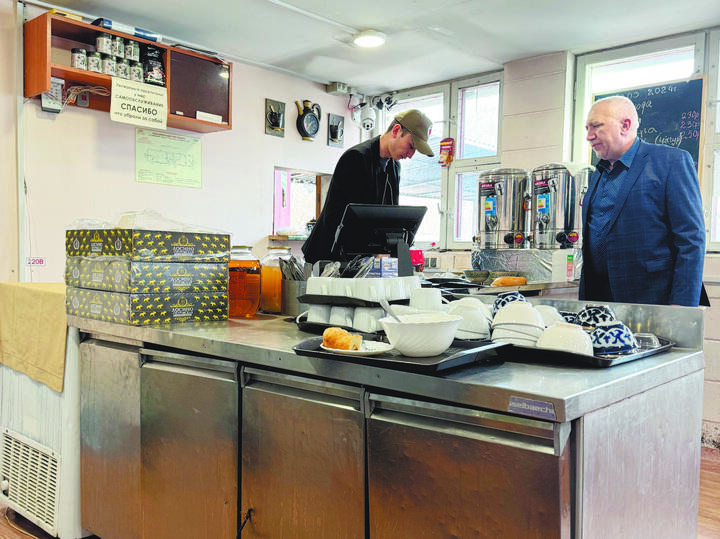Unsweetened “Sakharovo”: what happens in the migration center after the terrorist attack
[ad_1]
Getting to the Sakharovo migration center on your own is not a test for the faint of heart. I was warned that the buses to the MMC were being stormed by citizens of foreign countries. I didn’t believe it: it was some kind of nonsense, there were noticeably fewer migrants even on the streets of Moscow.
I arrived at the Prokshino metro station half an hour before public transport departed. About a hundred people gathered on the platform. Not a single Russian. The audience is diverse: workers in overalls, young people with folders under their arms, women in hijabs. Tajik-Uzbeks huddled together on the benches. We sat with our eyes glued to our phones. We were all waiting for the bus to Sakharovo.
From time to time, a man with business cards approached the crowd. People received them with gratitude and exchanged contacts with him. I heard that near the metro you can negotiate for a fee to take an exam in the Russian language, resolve issues with obtaining a patent for work and a residence permit. I asked the man for a business card. The man retreated: “You don’t need anything.”
– Taxi to Sakharovo, guys! One spot left! – shouts were heard.
The people did not react. The drive to the MMC is at least 50 km. The cost of a taxi ride is 3,000 rubles for three. A little expensive.
When the bus appeared, people rushed away. People rushed behind the bus, grabbed the doors, shouted, pushed each other with their elbows in order to take a standing or standing place.
The women were the last to get onto the bus. I drove for more than an hour in the stuffiness, standing almost on one leg, tightly squeezed on all sides by migrants.
When I escaped from the stuffy captivity, I was stunned for the second time. There were thousands of migrants around the MMC. It’s like a city within a city. And there was an atmosphere of its own here.
Dozens of men were squatting in the parking lot, women were feeding babies, taxi drivers were fighting for passengers, and drinks and samsa were being sold from the hood of an old car.
“There are not many people today: firstly, it’s Ramadan, and secondly, many people hid after the terrorist attack,” a Russian taxi driver approached. — There was a decent influx in March. As soon as it gets warmer, they come here. You won’t be able to talk to anyone. They are cautious and do not make contact unless you infiltrate their environment. And they are also cunning, they complain that there is no money, but they themselves have 5 thousand bills sticking out of their pockets. They just pretend to be beggars.

I remembered my conversation with an employee of the migration center, who told me that somewhere in the Sakharovo parking lot they were selling certificates for passing the Russian language.
“Nothing like that happens in the parking lot,” the taxi driver assured. — Everything is inside, on the territory of the MMC, but with a Russian passport they don’t let you in.
— Is it true that most migrants do not speak Russian, but receive a certificate of language proficiency?
“There are educated people who speak better than you and me.” But some really can’t say a word. One such friend could not withdraw money from an ATM. I took it upon myself to help. Only with the help of his fellow countrymen did he explain how much money was needed. But that man came to receive a patent for his work, and planned to take the Russian exam.
According to the interlocutor, the most unpleasant topic in the migrant community is the terrorist attack in Crocus. Visitors don’t talk about this.
“Many migrants who know me well stopped communicating with me after the tragedy. They were probably offended that they began to shake after what happened.
The man noted that there were no raids at Sakharovo: “Everyone comes here with documents, there are no violators. And the police here are constantly monitoring them.”

“I know Moscow better than Dushanbe”
Not far from the migration center, behind the forest belt, there is a cafe for our own people. I walk to the establishment past the forest, where migrants are located on every stump, log, and lawn. According to local residents, many spend the night on the street, because in the morning they still have to go to the migration center. The conversation with the people from the forest did not go well. Nobody said a word. And go figure whether they understood me or not. “Everything is fine with us,” one muttered and turned away.
Well good, so good…
The cafe is located in a village house on private territory. The establishment is run by immigrants from Central Asia.
Prices are budget. Shurpa, pilaf, lagman, manti for 250 rubles, samsa – 80, kebabs – 150-220.
— Do you want three-in-one coffee or instant coffee? — asked the young man behind the counter.
I hesitated. It’s unlikely that they’ll prepare lavender raff for me here.
“Oh, let me make you some good coffee, Turkish, according to my recipe,” the guy suggested.
There are not many people in the establishment. People ordered, quickly ate and left. They didn’t look up from the plate. There was no desire to communicate with strangers. And in general they looked intimidated.
“I don’t want to tell you anything, and why, you can see for yourself,” one of the visitors waved it off on the way out.
After the cafe I went to the village of Sakharovo. There is a grocery store here, on the building there is a sign “Exam”. Entry for groceries is on one side, exams are accepted on the other.
— We are not doing exams yet, do we need to explain why? We only accept translations and help with paperwork,” said the woman at the window.

On the street next to the “examination center” men, a Russian and a Tajik, were smoking. I talked to the last one.
— The story with the exams is really over for now. As far as I know, they do all this at the MFC: you pay 5,000 rubles and a certificate of language proficiency is in your pocket,” the man explained. – Although I took the exam on my own. For me, these are kindergarten questions. For example, it was necessary to answer the question: a person came to a children’s store, what could he buy there. And three possible answers.
A native of Tajikistan said that he came to Russia 18 years ago and got a job as a taxi driver: “I know Moscow better than Dushanbe. I like it here, I don’t want to go anywhere else.”
— Is it true that passengers refuse the services of Tajik taxi drivers?
— I saw information about this on the Internet, it seems to me that it is fake. No one refused to travel with me. Although I have heard complaints addressed to me before. After all, I am growing a beard, so some passengers blamed me for this, insisting on the wrong religion. I stopped such attacks: you have your own religion, we have ours. But now I still shaved my beard out of harm’s way. My father advised. Many people call me from Tajikistan and advise me to return. Where will I return? I have a wife, children, and work here. Although over the past year many migrants have left Russia for Europe. Here, at best, you can earn 2,000 rubles a day. In Europe they pay 100 euros a day.
— Is everyone accepted in Europe?
— They hire everyone with a Tajik passport, there are plenty of vacancies. But for those who managed to obtain Russian citizenship, entry into Europe is prohibited.
— Why are people leaving Tajikistan in large numbers?
“Many people are leaving the army. In Tajikistan, conscript service lasts two years. It’s not easy in the army, hazing is terrible. My friend, who became a Russian citizen, served in your army and believes that this is a sanatorium compared to what is happening here.
— Has the flow of people leaving increased after the terrorist attack?
– There is such a thing. We’re having a hard time right now. They are leaving not only from Russia, but also from Kazakhstan, where the oppression began. I often take people to the border with Kazakhstan, where checks have now been tightened. This has never happened before.

“Why should we be collectively responsible?”
When I returned to the Sakharovo International Medical Center, there were more people squatting near the parking lot. It’s time for lunch. Everyone ate samsa.
And here one could observe the whole range of human emotions.
A man of Slavic appearance shouted into the telephone receiver: “Everything turned out in such a way that it did not work out. Your wife doesn’t speak Russian at all, not a single word, how will she pass the exam? I’m stressed myself. I understand that you are tired, all these conversations, the situation is difficult… It’s hard for you…”
Nearby, foreigners were not discouraged: “We didn’t pass the tests, tomorrow is the second attempt.”
A courier with a green box behind his back accepted the order.
A girl in a white hijab was crying.
Around me, dozens of people were talking on the phone, set to speakerphone. No one spoke Russian.
— Do you happen to work at Sakharovo? — a man of about 35 suddenly turned to me. “I’m from Tajikistan, I can’t get a patent to work in Moscow, can you help me?” I will cry.
I explained that I have nothing to do with the migration center.
– Maybe you have friends there? — the Tajik did not let up. “There’s no reason for me to return home.” Our average salary is 15 thousand rubles. If all the migrants return, wages will fall even further because competition will increase. People will start fighting for jobs. Some of my friends went to England to pick strawberries. Job openings have appeared in South Korea, people are inviting people to work in agriculture or construction.
— How do migrants communicate in South Korea if they don’t speak the language?
– On the fingers, just like here. A friend got a job as a truck driver in Europe. He was promised a salary of 3,500 euros, but they deceived him and gave him 2,500. He lives in a car and saves on everything. There is not enough money. Recently the tank broke and he received a repair bill of 2000 euros. He also picked up a decent amount of fines. Now they write that Tajiks are leaving here after the terrorist attack, although the massive flow to Russia has long stopped. It’s not so sweet here anymore.
Meanwhile, pure Russian obscenities can be heard in the parking lot. Tajik taxi drivers did not share the passenger.
“It’s hard for us after the terrorist attack, our nerves are on edge,” explained one of the instigators of the conflict. “I was supposed to check into the apartment today, we agreed with the landlady. And she writes to me: because of Crocus, I don’t want to rent it to you. I indicated exactly that, I can show you the correspondence. Why should we be collectively responsible for ghouls?
It was getting close to evening. Only migrants, strictly with a passport, are allowed to get to the bus stop that goes towards the metro (the stop is located on the territory of the migration center, behind the fence). The policeman was surprised at my Russian passport: “What have you forgotten here?” I explained. He gave the go-ahead with one condition – filming is strictly prohibited – and added: “I advise you to take a taxi.”
At the bus stop, a nightmare was happening. Several hundred people were waiting for transport.
“I probably won’t fit on the bus,” one of those gathered said reasonably. “I was coming here and almost lost consciousness in the crush.” I couldn’t pay for the fare and didn’t make it to the terminal. On the way out, the inspector caught everyone and issued a fine of 2,000 rubles for not paying on time. The main thing is that it was a waste of time to come here. I also lost money.
He really didn’t fit on the bus. Actually, like me and a hundred other people. Due to the number of passengers, the bus was tilted to one side, the doors could barely close.
We also had to miss the next buses.
— Do you know what struck me most in Moscow? — a young guy turned to me. — When I first flew here and was waiting for the bus at the airport, there was a line behind me. The bus arrived, and they tapped me on the shoulder: are you coming through? I was stunned by such politeness. And I look at what’s happening here – and it’s like I’m in my homeland…
[ad_2]
Source link








